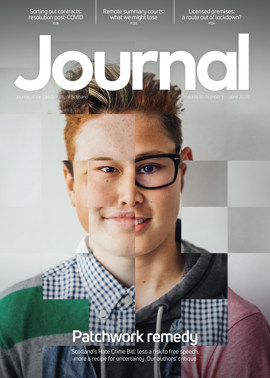So you want to work from home...
Every crisis presents a challenge, but also an opportunity. The challenge is obvious, but the opportunity is perhaps overshadowed at the moment. Read on, Macduff.
Having undertaken locum and agency work in the civil courts for a number of years now, I have been working from home throughout that time, and please believe me when I tell you that avoiding the commute on a Monday morning with rain, hail or snow in the dead of winter is an experience not to be missed.
Modern technology provides, at a reasonable cost, all the facilities required to do my job. It is not necessary to engage expensive data management firms, which I have found, frankly, too complicated. Instead, I rely on the following hardware and software:
- laptop;
- two printers (laser and inkjet);
- scanner;
- landline/mobile phone;
- electronic fax;
- Microsoft Office;
- Dragon Professional speech recognition software;
- accounts software;
- wi-fi;
- Amazon Alexa.
If I had to choose the most important tool at my disposal (my brain aside), I would pick the speech recognition software. I am writing this article by voice. I have been using the software for a number of years, and while it is not 100% proof, it’s not far off it. Lockdown has given me the space and time to get into the software even further, and I’m now able to create “commands” which perform various functions in seconds simply by saying a short phrase, for example opening a particular file or folder, or creating a motion or email addressed to a chosen recipient.
Working from home has a number of advantages, with few disadvantages. An initial meeting with the client can take place in a bespoke office hired for that purpose and thereafter, in my experience, communication invariably takes place in court, over the phone or by email. Occasionally, I have used Skype, but it’s only really of advantage if there is a long distance involved.
Electronic pleading: the future
Apart from knowledge of the law, the essential work tool for any lawyer is communication, and effective communication at that. While each of us is imbued with our own particular set of skills, it should never be underestimated how important the ease of communication is or should be. The more streamlined the communication, the more effective and productive the client/solicitor relationship.
This principle can be applied in all sorts of ways. At the moment, the civil courts operate an archaic system involving an exchange of written pleadings which eventually form into something called a record. It is mechanically much more difficult than it need be. Why don’t we develop a system whereby one file is used from start to finish, which is exchanged back and forth between the parties’ agents through a secure, online portal, within which each side can set out its stall, ending with a document equivalent to the record; and which can then be formally lodged in court as the first step?
This would save a great deal of time and expense, though obviously sanctions would require to be in place to avoid any dragging of feet. It would save having to rely on a judicial resource which is short-staffed and under-resourced (and likely to be even more so when we emerge from COVID), and which, without meaning to, contributes to the delay and frustration in achieving the point of the exercise: justice. This format would not prevent any urgent hearings, and if necessary the court could have at its disposal a working record as and when required.
It astonishes me how often lawyers replicate the same information repeatedly for different recipients, when modern technology provides a mechanism for creating the information once only and then relying on it when shared elsewhere. For example, Microsoft Office consists of various packages including Word for document creation and Access for databases. When raising an action for the first time, the salient details are entered into Access, from which the data can then be extracted into an initial writ and any other type of court pleading thereafter. This avoids unnecessary typing and the possibility of error in re-typing.
It would be possible for the court to set up and maintain such a database, thereby streamlining the exchange of information between it and the parties, who would be given secure access to their case. The courts in Scotland have stuck their toe in the water with the creation of the simple procedure process, which is now entirely online. Unfortunately, it hasn’t proved quite as simple as was hoped, but only through design rather than principle. It is definitely the way ahead, but it will only succeed if all the stakeholders are consulted and their various interests advanced.
When attitudes change
My office is now virtually paperless, and I have Microsoft OneNote to thank for that. It seamlessly stores everything in my file in chronological order, and has the fantastic advantage of a search facility which can find what I’m looking for in seconds, compared to leafing through a file of paper relying on luck rather than system. It saves on cost and storage. The Law Society of Scotland has no difficulty with it.
Over and above all the mod cons, however, there is one remaining obstacle: changing attitudes. I’m old enough to remember when the fax machine was introduced and the controversy surrounding the efficacy of missives sent by fax. Now it’s become old fashioned, of course, but we lawyers are slow to embrace change. I understand the comfort derived from tradition, but necessity is the mother of invention. Prior to lockdown, I had various battles around different courts about the acceptance, or rather rejection, of my electronic signature on writs. Suddenly, nay almost overnight, the practice has become acceptable. It truly is a funny old world.
If you’re thinking therefore of working more from home when normality returns, first change your attitude. Everything else will fall into place.






